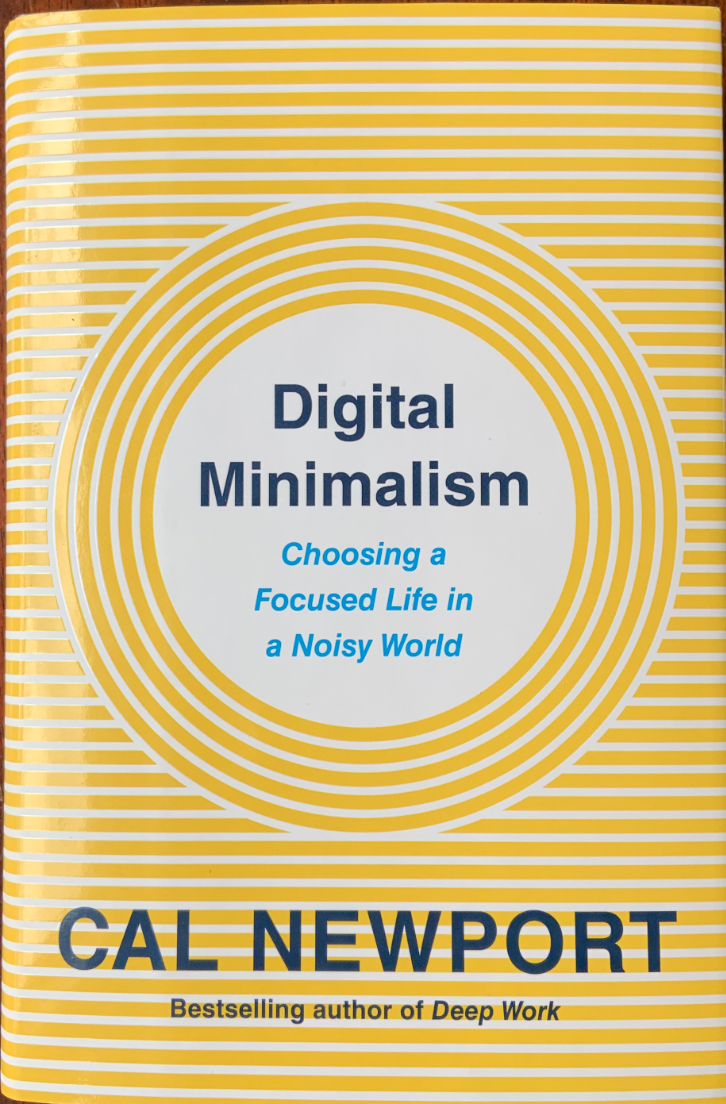Book review: Digital Minimalism
 ChatGPT
ChatGPT “Santa Claus is Coming to Town” can be a pretty awkward song if you really look at the lyrics. Especially the verse that talks about Santa seeing you when you’re sleeping, knowing when you’re awake and knowing if you've been bad or good.
“Santa Claus is Coming to Town” can be a pretty awkward song if you really look at the lyrics. Especially the verse that talks about Santa seeing you when you’re sleeping, knowing when you’re awake and knowing if you've been bad or good.
I think technology is kind of like Santa Claus in its pervasive nature in our lives. It tracks you while you're sleeping. It knows how many times you pick it up to use it while you're awake. It knows your browser history, hours spent playing games or browsing certain apps. Technology is something we are not getting away from and it will only grow more pervasive as time goes on.
How do we manage this tension?
First, we acknowledge that our relationship with technology is probably worse than we would like to admit.
This was made very clear to me when I set up my iPhone to track my screen time, to shut down certain apps after a specific time limit, and when I looked at my “pickups” on a daily basis, including the first pickup and the total pickups throughout the day. These are telling statistics, and they have no vested interest in the answer. It just is what it is. That's the fact. My relationship with technology is worse than I wanted to admit.
Then I read Digital Minimalism by Cal Newport and my eyes were opened even more. This book is an absolute must read for every leader, especially the biblical-minded leader. How can we be good stewards of our time but also good stewards of the technology around us? Newport doesn't say get rid of all technology, but have a healthy relationship with it.
Here are three ways to change your relationship with technology that I gathered from this book.
1. Schedule periodic breaks from technology.
We are not created to be constantly connected 24/7. Our world is attempting to be wired that way, but it doesn't work. Even technology needs a break. Even your phone needs to be shut down from time to time, or updated, or plugged in. Your TV doesn't stay on 24/7, neither do the lights connected with your smartphone. It is not wise to stay constantly connected and powered on. We must schedule strategic times away from technology.
When we schedule these breaks they allow us to be fully present in the moment, to even go back to paper and pen to write, or have a physical copy of a book in our hands. It gives our eyes a break from the screen and gives us an increased ability to focus and put away the easy distractions of notifications and continually refreshing pages and content.
2. Conduct a technology audit on your current usage
One poignant quote from Newport is speaking of the value added or lost by the newest, latest, best app available. He writes, “It’s easy to be seduced by the small amounts of profit offered by the latest app or service, but then forget its cost in terms of the most important resource we possess: the minutes of our life” (p. 42). Technology can make life easier. But it doesn't always deliver on that promise.
Does your current technology usage increase your productivity and ability to get things done? Or are you wasting precious minutes of your day absentmindedly scrolling social media or catching Pokemon or shooting Zombies or crushing candy or running around in Fortnite? Conduct an audit on your current usage so you can determine whether or not something is a positive element or negative in your life, ministry and leadership.
3. Practice intentional rather than boredom access
Much of Digital Minimalism is caught up with the idea of intentional rather than habitual. We choose our relationship to technology, so we must stop allowing technology to put the parameters on how and when and why and where we use it. When we feel bored or awkward, how easy is it to reach for the phone or tablet, open the app and get lost in a world somewhere other than where we are? It has become America’s favorite pastime—this “boredom access.” Instead, allow yourself to be bored, to look around, to notice, to be present, to engage others in conversation and rescue them from their boredom access.
Turn boredom access into intentional access and give yourself some healthy boundaries about where, when, how long/often and why you will access technology, especially certain apps that feed into our boredom like social media apps. Be intentional and make the choice; don’t let technology make the rules.
Photo source: istock
| Ben Marshall is a Pastor at Pathway Church in Beaver Falls, Pennsylvania. He works with teenagers and young adults. He is passionate about leadership and raising up the next generation of biblical leaders. He is a blogger, guitar player and sports enthusiast. Ben currently resides in Beaver Falls with his wife Connie and their two daughters, Aliya and Sophie Learn More » |
More on Communication and Social Media
- Essential elements to make a pastor’s welcome video better (by Mark MacDonald)
- 4 required church website images (by Mark MacDonald)
- 5 do’s and 5 don’ts of church communication during the holidays (by Mark MacDonald)
- Church branding essential: matchy matchy (4 areas) (by Mark MacDonald)


